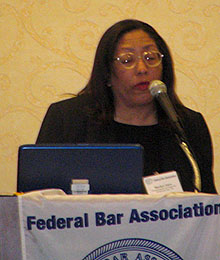Treaty rights vs. sovereign rights:
Speakers at the Federal Bar Association's Indian law conference didn't necessarily disagree with that contention at a panel on the dispute. But they said the attempt to shift the debate to one of sovereignty ignores some key issues, including an 1866 treaty at the heart of the dispute, as well as racial discrimination.
"Cherokee Nation leaders are making statements that they can break the treaty any time they want to," said Marilyn Vann, the president of the Descendants of the Freedmen of the Five Civilized Tribes and the lead plaintiff in a lawsuit that challenges how African descendants have been treated by the tribe.
"I would be alarmed by that," added Vann, who noted that the tribe has cited the treaty to defend its rights in other cases. "If a tribe can break the agreement, the fed government can break the agreement."
"Do we really honor ancestors when we refuse to recognize their descendants?" she said. "I really hopes tribes can get away from this notion of blood as the essence of Indian identity."


No comments:
Post a Comment